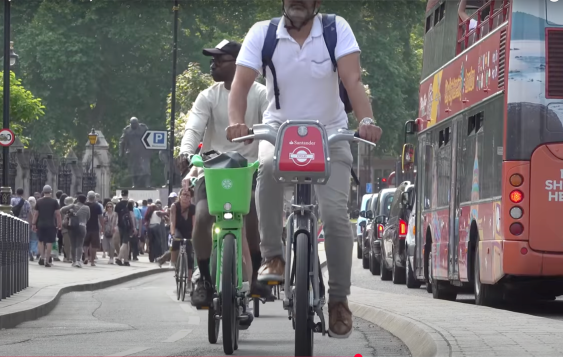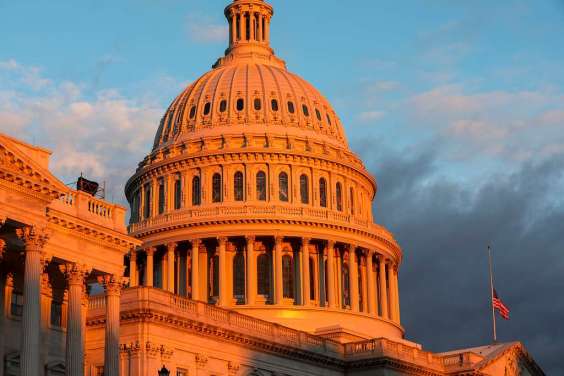 The SFBC will try again to protect bicyclists and pedestrians at Market & Octavia by permitting camera enforcement against illegal right turns.
The SFBC will try again to protect bicyclists and pedestrians at Market & Octavia by permitting camera enforcement against illegal right turns.With a deadline for filing bills in the Legislature for 2010 fast approaching, the California Bicycle Coalition and local advocates are debating what this year's statewide agenda should be. The San Francisco Bicycle Coalition is promoting three ideas they'd like to see become law, according to Program Director Andy Thornley.
The SFBC's first priority is a local one: another attempt to allow the city to use cameras to enforce against illegal right turns at the Central Freeway and Market Street. In 2008, Assembly Bill 23 would have accomplished this but it was scuttled when State Senator Leland Yee (D-San Francisco), who sat on the Transportation Committee, objected due to privacy concerns. Yee's off the committee now, so the SFBC thinks it has a better chance.
Another SFBC priority comes from the San Francisco Bicycle Plan, which recommends a change in state law to permit passing on the right. It's common sense and commonplace for bicycles to pass cars on the right, and tickets are rarely issued, but in the event of a crash, lawyers and cops will sometimes assign blame to cyclists.
Mike Smith of San Francisco knows too well the implications of this legal status. He suffered a "severe back injury" when a passenger jumped out of the right side door of a taxi cab into his path and pushed him into the stone wall of a subway entrance. Even though there were bicyclists in front and behind traveling the exact same path, the jury assigned 25 percent of the fault to Smith for passing on the right. The police officer told him he should have passed on the left.
"Not passing on the right really does contradict what bicyclists are supposed to do," Smith said, echoing the feelings of most San Francisco bicyclists.
The big idea coming out of the legislative agenda discussion is the adoption in California of a "vulnerable road users" protection bill. This would enhance the penalties when a motorist violates a traffic law and contributes to the injury of a vulnerable road user. Currently, there are no extra penalties for injuring a pedestrian, and prosecutors tend to consider manslaughter or attempted manslaughter charges too severe for "an accident," so they simply issue a traffic ticket and let the civil courts deal with justice for the vulnerable victims of traffic crashes. A vulnerable road users law would give authorities some middle ground between a ticket and manslaughter.
All the organizations contacted for this article - the SFBC, the Los Angeles County Bicycle Coalition and the Silicon Valley Bicycle Coalition -- have lobbied the CBC to push for this bill at the state level, and the CBC will discuss the topic at their board meeting next week.
The bill could be modeled after a 2007 Oregon statute that strengthened the penalties for injuring or killing a vulnerable road user -- defined as a pedestrian, a highway worker, a person riding an animal, the operator or user of a farm tractor, a skateboard, roller skates, a scooter, or a bicycle -- without making it a crime that requires a jury trial. Motorcyclists were at times included in the definition of vulnerable road users, but that was removed before the final version.
Instead of simply pleading guilty to a traffic violation and mailing in the fine, a person convicted of this offense must appear in court and be sentenced to a traffic safety course, 100 to 200 hours of community service, a fine of up to $12,500, and one year of suspended driving privileges. Payment of the fine and suspension of driving privileges may be waived by the court upon completion of the traffic safety course and community service.
According to Doug Parrow, the chair of the Bicycle Transportation Alliance's legislative committee, the results have been disappointing. "To my knowledge there has not been a motorist charged under the vulnerable road users statute," he said. The law requires police officers on the scene to indicate on the traffic ticket that a vulnerable road user was injured in the course of the violation, and it turns out that officers do not make that indication.
"We were operating under the assumption that the police would take this seriously and operate in good faith but … that's not necessarily the case," he said. It may be simply a matter of education. He recognizes that there is no way police officers could know every law on the books and speculates that most are unaware of the law. "We might just need to do a little bit of education," he said.
The California Bicycle Coalition will have to make a decision by next week on its legislative agenda for the year. While they maintain a lobbyist on retainer in Sacramento, their membership is small compared to the top advocacy organizations in the state.
"The CBC needs to provide leadership in coordinating the asks but the muscle behind that needs to come from local organizations," said Corinne Winter, executive director of the Silicon Valley Bicycle Coalition.





